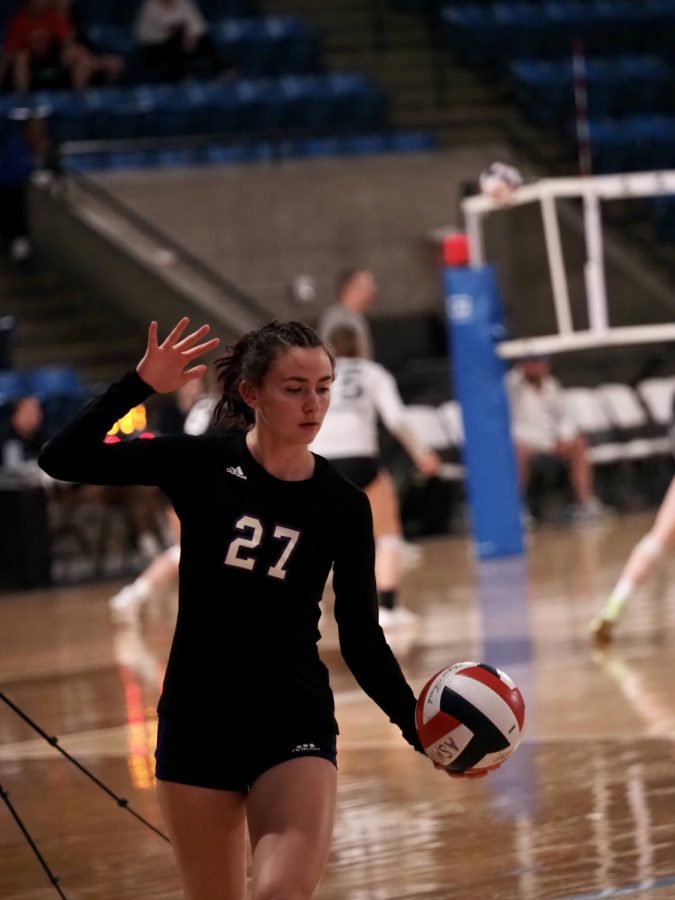Students struggle with stress
Self-care might be the answer
Photo by and used with the permission of Ann Steuer
Steuer enjoys playing sports and exercising as part of her self-care. She plays volleyball and soccer to keep herself both physically and mentally strong.
72.6% of students report feeling stressed or anxious often or always, according to a March Bear Facts Student Media survey of 146 students. With a majority of students feeling this way, health teachers caution that this stress can become a problem.
“The longer we let [stress] build up, the more daunting it seems to overcome. It seems like that proverbial hill we have to climb keeps getting bigger and bigger, until it almost seems like it’s unreasonable,” Terry Coughlin, health and PE teacher, said. “I think that’s the point we get to if we don’t take a second to stop and deal with [stress], even in small increments, to stop that building process.”
One way to deal with “building stress” is practicing self-care, which Coughlin believes is individualized and he has his own definition for it.
“[Self-care is] something that motivates you, that brings value to you, that’s important to you, “ Coughlin said. “[It is] something that will fill up your cup and leave you with that great feeling of accomplishment of centering yourself. [Self-care] either brings you back to balance, or brings you some happiness and pleasure and enjoyment.”
But self-care may be hard to put into practice in one’s life as 67.1% of LZ students believe that they are not spending enough time on self-care, according to the Bear Facts survey.
“We’ve placed so many demands on individuals that [society has] kind of devalued individual time. I think that a lot of people get caught up in the next thing, [and] we’re kind of taught to move onto the next thing we have to do. We’ve kind of gotten into this rat race and monotonous cycle of checking boxes: homework, tests, and then the next extracurricular activity,” Coughlin said.
Having a full schedule is something many students like Ann Steuer, junior, are familiar with. She participates in soccer, volleyball, Habitat for Humanity, React Club, Interact Club, and Meditation Club, and takes several AP and honors classes; however, she says she still makes time for herself and practices self-care in ways she finds beneficial.
“For me, self-care is probably reading a book. I read a lot and I find it relaxing. Self-care is also exercising and going to practice is something that’s super destressing, and it makes me feel more relaxed after. Maybe eating unhealthy foods can be part of self-care, like ice cream,” Steuer said. “I think the point is just letting your worries or concerns about food or other things go, and just spend some time by yourself doing something basic that you enjoy.”
When one neglects taking care of oneself and doing fun things, others can tell, Steuer said.
“I feel like I can tell when someone’s not taking care of themselves and I think in order to be happy with yourself, you need to take care of yourself. Especially in high school, you’re so busy with all the stuff that you have to do that taking care of yourself is something that gets overlooked,” Steuer said, “but I still think [self-care is] extremely important. It looks different for everyone, but I still think that everyone should try and take care of themselves and do things that they feel would make them feel better.”
To feel better and be healthy, Coughlin believes one needs to have a balanced wellness triangle, which includes mental, physical, and social health.
“Your social emotional health, your mental health, and your physical health all have to work together. If one’s not working, the other two aren’t going to work at their best either. When you’re in times of stress, it is hard to get yourself motivated to do anything, whether that be exercise or eat properly. [Even] just general hygiene, those things get difficult to do,” Coughlin said. “I think if we are physically healthy as well, that helps our mental health, and there’s science behind the release of dopamine and serotonin through exercise that can help elevate our mood.”
Healthy coping mechanisms are not always easy to implement though, Coughlin said. Some students turn to alternate methods to combat high levels of stress or anxiety, such as illegal substances. 7.4% of students use marijuana products and 1.9% vape, according to the Bear Facts survey. Jill*, who’s true identity Bear Facts is keeping anonymous, says she smokes marijuana and vapes nicotine to deal with stress.
“Weed makes you very calm because it messes with your brain. Last night, for example, I was very high. I can’t remember anything that happened before 2 am. Yes, it messes with your mind, but it also just makes you very calm,” Jill said. “I know that weed is used for a lot of mental health stuff, which is why I think that it’s better for you than nicotine is.”
Even though she acknowledges that nicotine is bad for one’s health, Jill says she still uses it and vapes almost every day.
“For anxiety, when you need to take a breath, [vaping] forces you to. When you’re inhaling, it makes you take a long breath and then hold it and then let it back out instead of just hyperventilating,” Jill said.
While vaping is a coping mechanism, it is not healthy, according to the American Lung Association, which reports that vaping can cause lung cancer, cardiovascular disease, and asthma. Jane acknowledges that drugs make mental health worse in some ways as well. There are other methods of self-care that are healthier as Steuer recommends.
“I want to encourage people to try their own form of self-care, even if that means reaching out to other people for help or prioritizing yourself over school every once in a while, because that’s okay. I feel like more people need to do that,” Steuer said. “I feel like I see so many people that are just exhausted all the time, and it doesn’t look healthy and it doesn’t look like it feels very good. I know myself that I’ve done that, I feel like more people should be trying self-care.”

For her third and final year on the Bear Facts staff, Emma will be serving as Magazine Editor-in-Chief for the first time. After high school, Emma hopes...

